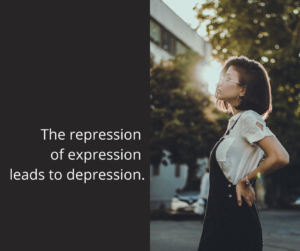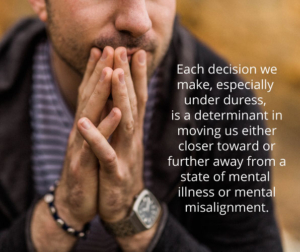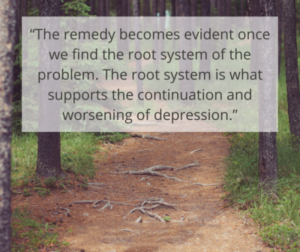What is the Christian Perspective on the Law of Attraction?
Ever since the publication of the 2006 book The Secret and the 2007 movie of the same name, the law of attraction has circulated in our pop culture vernacular. Oprah Winfrey, Jim Carrey, and other celebrities are adherents of this movement. You might not even realize the roots of the movement, but maybe you’ve heard people talking about positive vibes, manifesting what you want, and other similar buzzwords or phrases.
 If you’re interested in self-help or self-development, you might have noticed popular social media figures promoting law of attraction concepts. For example, YouTuber Lavendaire, who has a million subscribers, wrote this on her blog:
If you’re interested in self-help or self-development, you might have noticed popular social media figures promoting law of attraction concepts. For example, YouTuber Lavendaire, who has a million subscribers, wrote this on her blog:
All realities begin in the mind: your beliefs become thoughts, thoughts become words, words become actions, and actions become reality. As you take action towards your dream, the universe will conspire to help you achieve it.
What exactly is this philosophy? Where does it come from? Is it compatible with a Christian worldview? Let’s talk about the background of the law of attraction and compare it with Scripture, and consider how we as Christians can think about this philosophy.
What is the Law of Attraction (LOA)?
The law of attraction is based on the New Thought movement, which began in the early 1800s in the United States under the teachings of Phineas Quimby. Quimby believed in mind healing and practiced hypnotism. Throughout the 1800s, Quimby’s ideas gained popularity, and in the early 1900s, the New Thought Alliance was formed, based on the idea that your mind creates your reality.
In 2006, Australian author Rhonda Byrne published the book and created the documentary called The Secret, and these ideas subsequently went viral. Dr. Neil Farber, writing for Psychology Today, summarizes the law of attraction:
The law of attraction (LOA) is the belief that the universe creates and provides for you that which your thoughts are focused on. It is believed by many to be a universal law by which ‘Like always attracts like.’ The results of positive thoughts are always positive consequences. The same holds true for negative thoughts, always leading to bad outcomes.
In other words, you focus on your desired outcome, and the universe will give you what you want. Your thoughts become your reality, and even more so, your feelings become your reality. The more you focus on health and prosperity, the more healthy and prosperous you’ll become. The more you focus on sickness, negativity, and poverty, the more sick and unhealthy you’ll become.
 Of course, this concept is attractive! It offers us a sense of control. Who wouldn’t want to be healthy and wealthy? But is this belief based on science and evidence, or is it pseudoscience? And more importantly, does this concept align with Scripture, or is it based solely on humanistic or New Age teachings?
Of course, this concept is attractive! It offers us a sense of control. Who wouldn’t want to be healthy and wealthy? But is this belief based on science and evidence, or is it pseudoscience? And more importantly, does this concept align with Scripture, or is it based solely on humanistic or New Age teachings?
LOA ideas include many concepts you may have heard in passing, including visualization, positive vibes, manifesting, mind over body, source energy, and more. This article will address some of those specific concepts and compare them to the truth of Scripture.
The LOA sucks people in by convincing them that they can receive their truest desires if they:
- Believe hard enough,
- Visualize clearly enough,
- Put out enough positive energy,
These ideas hold a kernel of truth. Positive thinking can, to a certain extent, improve your mental and physical health. Optimism is one key to resilience. Treating other people well and being a happy, upbeat person tends to have a ripple effect on those around you. In the book of Proverbs, we often see that wisdom is its own reward (e.g. Proverbs 8:18, 9:12, 22:4).
However, LOA ideas represent a perversion of these truths. You can’t trust the universe to bless you just because you’re putting out positive vibes. Indeed, because the universe is a created thing, it has no power at all to either bless or to curse – that power belongs to God, alone. In the end, this belief is just another futile attempt to manifest happiness and prosperity through one’s own efforts.
Criticism of the LOA
Scientists, psychologists, and other experts claim the law of attraction is pseudoscience, yet its ideas are still wildly popular and gaining traction. Writing for How Stuff Works, Nathan Chandler says:
But Byrne’s ‘secret’ is not really a secret. For centuries, both philosophers and con men have leveraged the LOA and its ilk both to buoy the spirits of the downtrodden and in some cases bilk vulnerable targets out of their cash.
 Certain aspects of positive thinking can create a self-fulfilling prophecy. You decide to be positive, so your happiness attracts people to you, leading to improved relationships, career progress, etc.
Certain aspects of positive thinking can create a self-fulfilling prophecy. You decide to be positive, so your happiness attracts people to you, leading to improved relationships, career progress, etc.
Ultimately though, the law of attraction requires belief in order to “know” if it works or not, which is why it can suck you in. You place your faith in attracting positivity, but you have to be fully invested – mentally and emotionally – to see if it “works” for you.
And if it doesn’t work? Well, instead of acknowledging their ideology is false, LOA proponents will claim that you didn’t put out enough positive vibes:
If you are focused on the belief ‘The Law of Attraction isn’t working for me’ then you dramatically increase the chances that the Law of Attraction won’t work. This is because you are focused on the concept of lack, which attracts yet more lack into your life. – Katherine Hurst
The Bible and the Secret Law of Attraction
Let’s compare some of the most popular concepts from the law of attraction with relevant Scripture passages:
Cognitive reframing and creative visualization.
The law of attraction requires that you reframe your thoughts from negative to positive, and visualize what you want to achieve. There is a scientific basis for visualizing an action before performing it, and how that makes you more likely to succeed. This is different from visualizing yourself winning the lottery, however.
The Bible teaches us to reframe our thoughts according to God’s Word (Romans 12:1-2). It also teaches us that we can trust and rely on God to take care of us (Proverbs 3:5). We don’t have to rely on putting out the right energy into the universe. The Bible tells us that God wants us to rely on Him, and He will work all things together for our good (Romans 8:28).
Positive vs. negative and like attracts like.
Again, there is a kernel of truth here. Science shows us that positivity improves mental and physical health. Common sense tells us that happy, healthy people tend to have more stable and functional lives.
But this doesn’t mean that your mind creates your reality. While God’s word teaches us to set our minds on things above (Colossians 3:2) and that we will reap what we sow (Galatians 6:7), it also teaches us that we’ll have trouble in this world (John 16:33) and that we must overcome evil with good (Romans 12:1).
Mind over body.
LOA proponents teach that you can overcome sickness and poverty, etc. if you let your mind conquer your body. But God’s Word teaches that he is the Creator, who is sovereign over his creation (Colossians 1:16).

If you’ve ever had the stomach flu, you know that all the positive thinking in the world isn’t going to get you out of it. You can’t manifest a cure for cancer (or coronavirus). Instead, we must turn to God the Creator and trust him in both good times and bad.
Source energy.
We don’t all come from the source energy of the universe, as The Secret Claims. We were made by God, and he is a being whom it is possible to know.
Manifesting.
Some adherents of the Law of Attraction claim Bible verses to support their beliefs (e.g., “with God all things are possible”). The prosperity gospel and Word of Faith movements teach similar concepts: if you believe in God’s Word, you will have a good life with many blessings; if you “speak truth” from God’s Word, you will attain material benefits and wealth.
The Secret claims that we are all divine and have one consciousness. If we just tap into the source energy, meditate, and put out positive vibrations, we will attract wealth and happiness.
These concepts are not in line with Scripture or science. They provide a false sense of control, as well as the temporary benefits that you can derive from optimism and healthy positivity. The shreds of truth can suck you in. We don’t manifest our reality. We simply take action, as human beings whom God created.
The law of attraction is not the same as the Bible. Here’s what Christians should do instead to improve our lives: live by faith, walk in obedience, and trust God. God is pleased by our childlike faith, rather than our hope that the universe will manifest wealth for us.
If you are struggling with hope and want to experience the mental health benefits of optimism and positivity, grounded in a biblical worldview, don’t hesitate to contact our office to set up your first appointment for Christian counseling.
www.psychologytoday.com/us/blog/the-blame-game/201609/the-truth-about-the-law-attraction
www.psychologytoday.com/us/blog/boundless/201706/the-law-attraction
www.en.wikipedia.org/wiki/Law_of_attraction_(New_Thought)
www.hellosensible.com/law-of-attraction-christian/
www.lavendaire.com/law-attraction-get-anything-want/
www.britannica.com/event/New-Thought
www.people.howstuffworks.com/law-of-attraction
www.huffpost.com/entry/the-science-of-visualizat_b_171340
www.thelawofattraction.com/law-attraction-doesnt-work/
“Barbed Wire Crown”, Courtesy of Jclk888, Pixabay.com, CC0 License; “Milky Way”, Courtesy of Free-Photos, Pixabay.com, CC0 License; “Intersection of Impossible and Possible”, Courtesy of Geralt, Pixabay.com, CC0 License; “Compass”, Courtesy of MarandaP, Pixabay.com, CC0 License

 Grief is not always related to physical death. It can be the death of a dream or the death of a life stage that you enjoyed. A new mother of a special needs baby may need to give up dreams for her child and the future she expected.
Grief is not always related to physical death. It can be the death of a dream or the death of a life stage that you enjoyed. A new mother of a special needs baby may need to give up dreams for her child and the future she expected. Two months after the funeral, everyone has gone back to their regular lives, except Diane. She has felt numb, telling everyone she is fine. But her anger at the slightest provocations, as when she is driving, shocks her. Diane feels withdrawn, sullen, and miserable. Finally, she reaches out for help at church. Her pastor suggests that she meet with a Christian counselor to deal with her grief.
Two months after the funeral, everyone has gone back to their regular lives, except Diane. She has felt numb, telling everyone she is fine. But her anger at the slightest provocations, as when she is driving, shocks her. Diane feels withdrawn, sullen, and miserable. Finally, she reaches out for help at church. Her pastor suggests that she meet with a Christian counselor to deal with her grief. On their wedding anniversary three years after Paul died, Diane visits his burial site with a much lighter heart. She still feels sad, but she is no longer consumed by grief. She thanks God for all the goodness Paul brought to her life. As she drives away, she praises God for bringing her to a place of acceptance.
On their wedding anniversary three years after Paul died, Diane visits his burial site with a much lighter heart. She still feels sad, but she is no longer consumed by grief. She thanks God for all the goodness Paul brought to her life. As she drives away, she praises God for bringing her to a place of acceptance. But he reaches for acceptance by setting a 24-month deadline to move out on his own again. During that period, he will receive the counseling support he needs to rebuild his spiritual and emotional reserves.
But he reaches for acceptance by setting a 24-month deadline to move out on his own again. During that period, he will receive the counseling support he needs to rebuild his spiritual and emotional reserves. The fear of abandonment can create lasting problems from childhood long into adulthood. Adults with abandonment issues may sabotage, consciously or subconsciously, personal relationships with others. This can take the form of pushing a partner away after a period of time to keep that person from eventually leaving first.
The fear of abandonment can create lasting problems from childhood long into adulthood. Adults with abandonment issues may sabotage, consciously or subconsciously, personal relationships with others. This can take the form of pushing a partner away after a period of time to keep that person from eventually leaving first. If the child comes from a poor family where the basics of food, running water, power, and heat are not provided consistently, the child may associate that with a lack of love. Loving parents try to provide for their children’s basic needs, and on some level, children instinctively know this.
If the child comes from a poor family where the basics of food, running water, power, and heat are not provided consistently, the child may associate that with a lack of love. Loving parents try to provide for their children’s basic needs, and on some level, children instinctively know this. During the aftermath of a parent’s death, the surviving parent must cope with their own emotions. Sometimes this means that they wind up neglecting their child’s emotional needs. This isn’t necessarily done on purpose; both child and parent are hurt.
During the aftermath of a parent’s death, the surviving parent must cope with their own emotions. Sometimes this means that they wind up neglecting their child’s emotional needs. This isn’t necessarily done on purpose; both child and parent are hurt. The behavior from the fear of abandonment causes a reaction from those involved. Unfortunately, the adult with these issues may get a sense of satisfaction from these reactions and the attention they garner and cycle through the behavior again. To the outside world, these people appear full of drama and consistently in new relationships. However, the truth is that the person is hurting with an emotional need that is still unmet.
The behavior from the fear of abandonment causes a reaction from those involved. Unfortunately, the adult with these issues may get a sense of satisfaction from these reactions and the attention they garner and cycle through the behavior again. To the outside world, these people appear full of drama and consistently in new relationships. However, the truth is that the person is hurting with an emotional need that is still unmet. The APA Dictionary of Psychology defines passivity as “a form of adaptation, or maladaptation, in which the individual adopts a pattern of submissiveness, dependence, and retreat into inaction.”
The APA Dictionary of Psychology defines passivity as “a form of adaptation, or maladaptation, in which the individual adopts a pattern of submissiveness, dependence, and retreat into inaction.” We can look to the Bible for examples of how passivity cost people tremendous amounts of heartache and loss. One clear example is Jacob, son of Isaac and Rebekah, as we read in Genesis 25-28. Though his brother Esau was the heir to their father’s inheritance, Jacob passively allowed his mother to manipulate the situation so he would receive the blessing.
We can look to the Bible for examples of how passivity cost people tremendous amounts of heartache and loss. One clear example is Jacob, son of Isaac and Rebekah, as we read in Genesis 25-28. Though his brother Esau was the heir to their father’s inheritance, Jacob passively allowed his mother to manipulate the situation so he would receive the blessing. Emotionally, passivity can exact a heavy toll. You may feel weak and insecure, lacking confidence in your ability to take charge of your life. Passivity can cause anxiety, depression, anger, and other emotional disturbances.
Emotionally, passivity can exact a heavy toll. You may feel weak and insecure, lacking confidence in your ability to take charge of your life. Passivity can cause anxiety, depression, anger, and other emotional disturbances. The parents come up with a 60-day plan for holding their son accountable for finding a job and his own place. They work with a counselor to form talking points for a loving confrontation.
The parents come up with a 60-day plan for holding their son accountable for finding a job and his own place. They work with a counselor to form talking points for a loving confrontation. But in those times, it was quite clear that such devices were generally for entertainment purposes. It was easier then for both parents and children to understand that when studying or doing other daily tasks, such devices had to be turned off or left at home.
But in those times, it was quite clear that such devices were generally for entertainment purposes. It was easier then for both parents and children to understand that when studying or doing other daily tasks, such devices had to be turned off or left at home. For lots of teens, their social media accounts have become their virtual “hangout” where they keep in touch with others, even if they are at home. Teens can easily spend hours on their various accounts as they scroll through their friends’ and family members’ accounts, communicate with others, and update their own social media pages. And this is where the anxiety comes in.
For lots of teens, their social media accounts have become their virtual “hangout” where they keep in touch with others, even if they are at home. Teens can easily spend hours on their various accounts as they scroll through their friends’ and family members’ accounts, communicate with others, and update their own social media pages. And this is where the anxiety comes in.
 When being mindful, the brain is trained to become aware of the things happening around them – sounds of water or animal life, the feel of the ground under their feet, the smell of their immediate environment, or the beauty of their world seen through open eyes. In this way, they may then be able to pull their minds out of the virtual world they may be in and reassess what is “real.” This is particularly helpful if they find their minds stuck on negative thoughts about a recent post or comment on social media.
When being mindful, the brain is trained to become aware of the things happening around them – sounds of water or animal life, the feel of the ground under their feet, the smell of their immediate environment, or the beauty of their world seen through open eyes. In this way, they may then be able to pull their minds out of the virtual world they may be in and reassess what is “real.” This is particularly helpful if they find their minds stuck on negative thoughts about a recent post or comment on social media. Though this stage of life may be a distant memory for you personally, it is important to be empathetic to your kids as they navigate through this often confusing and emotionally-charged period of their lives and face some of the common challenges of teenagers.
Though this stage of life may be a distant memory for you personally, it is important to be empathetic to your kids as they navigate through this often confusing and emotionally-charged period of their lives and face some of the common challenges of teenagers. In addition, social media perpetuates another unpleasant issue — cyber bullying. With private messages open, and with anyone open to comment on your appearance, bullying is a common and corrosive issue among this age group.
In addition, social media perpetuates another unpleasant issue — cyber bullying. With private messages open, and with anyone open to comment on your appearance, bullying is a common and corrosive issue among this age group. The adolescent years can be extremely confusing, as you are met with deep questions over purpose and identity. What are you going to do after finishing school? Who are the friends that will stick by you? What is the true meaning of your life?
The adolescent years can be extremely confusing, as you are met with deep questions over purpose and identity. What are you going to do after finishing school? Who are the friends that will stick by you? What is the true meaning of your life? messaging.
messaging. Underlying medical conditions (such as thyroid or hormonal issues), use or abuse of prescription medication or other substances (alcohol, marijuana, etc.), a lack of adequate nutrition (eating too much sugar or processed foods) or physical activity, and any pre-existing addictions may contribute to the development of depression.
Underlying medical conditions (such as thyroid or hormonal issues), use or abuse of prescription medication or other substances (alcohol, marijuana, etc.), a lack of adequate nutrition (eating too much sugar or processed foods) or physical activity, and any pre-existing addictions may contribute to the development of depression.

 Problematic patterns of intrapersonal relating (the way we relate to ourselves generally as well as how we respond when disappointed, hurt, or rejected) tend to be overlooked and/or misunderstood in terms of their contribution to the development of depression and other mood disorders.
Problematic patterns of intrapersonal relating (the way we relate to ourselves generally as well as how we respond when disappointed, hurt, or rejected) tend to be overlooked and/or misunderstood in terms of their contribution to the development of depression and other mood disorders. Forgiveness is a major theme in the Bible, if not the theme. It is a part of the whole narrative of scripture, describing the process of the fall of man in sin and God’s forgiveness of sin through the life, death, and resurrection of Jesus.
Forgiveness is a major theme in the Bible, if not the theme. It is a part of the whole narrative of scripture, describing the process of the fall of man in sin and God’s forgiveness of sin through the life, death, and resurrection of Jesus. “A process that allows you to untangle the relationship among your thoughts, your actions, and the responses of your body. As you’ll see, forgiving people for what they did doesn’t mean forgetting what they did. It also doesn’t mean accepting it, excusing it, defending it, or being neutral about their nasty actions. It doesn’t mean becoming passive and taking no action to make things better. Rather, forgiving requires developing a better understanding of the actions of others and taking steps to improve your family life, work life, and overall happiness. Forgiveness means letting go of the anger.”
“A process that allows you to untangle the relationship among your thoughts, your actions, and the responses of your body. As you’ll see, forgiving people for what they did doesn’t mean forgetting what they did. It also doesn’t mean accepting it, excusing it, defending it, or being neutral about their nasty actions. It doesn’t mean becoming passive and taking no action to make things better. Rather, forgiving requires developing a better understanding of the actions of others and taking steps to improve your family life, work life, and overall happiness. Forgiveness means letting go of the anger.” Step 1: Uncover anger
Step 1: Uncover anger Offer forgiveness to them, even if (when) they do not deserve it. It could be as simple as stating, “I am choosing to forgive you.” This is an act of grace and mercy toward another. It demonstrates to them that you are letting it go, and it gives them a picture of the way Christ forgives them, too.
Offer forgiveness to them, even if (when) they do not deserve it. It could be as simple as stating, “I am choosing to forgive you.” This is an act of grace and mercy toward another. It demonstrates to them that you are letting it go, and it gives them a picture of the way Christ forgives them, too. In general terms, depression is a state of being. “Being,” in this case, is an active experience of the three dimensions of depression, which are feelings, thoughts, and behaviors. Any definition of depression that excludes one or more of these elements is inaccurate and misleading. Depression, then, is an active depressing of our thoughts, feelings, and actions. When something is depressed, it is pressed down.
In general terms, depression is a state of being. “Being,” in this case, is an active experience of the three dimensions of depression, which are feelings, thoughts, and behaviors. Any definition of depression that excludes one or more of these elements is inaccurate and misleading. Depression, then, is an active depressing of our thoughts, feelings, and actions. When something is depressed, it is pressed down. The question you must ask yourself is, “Is what I am experiencing interfering with my ability to live and enjoy life?” If the answer is yes, depression counseling may be the solution for you. To help you answer this question (for yourself or a loved one), consider the following real-life manifestations of a depressed state of being.
The question you must ask yourself is, “Is what I am experiencing interfering with my ability to live and enjoy life?” If the answer is yes, depression counseling may be the solution for you. To help you answer this question (for yourself or a loved one), consider the following real-life manifestations of a depressed state of being. Severe experiences of depression are avoidable. We are beings crafted for connection. When we begin to feel sad, we sometimes isolate ourselves particularly from those who love us the most. We fear judgment from others, and most of us consider therapy or counseling a last resort because of the following myths and false beliefs. Have any of these thoughts prevented you from seeking depression counseling?
Severe experiences of depression are avoidable. We are beings crafted for connection. When we begin to feel sad, we sometimes isolate ourselves particularly from those who love us the most. We fear judgment from others, and most of us consider therapy or counseling a last resort because of the following myths and false beliefs. Have any of these thoughts prevented you from seeking depression counseling? You were not designed to live life, do life, and cope with life on your own. Look back to the beginning. God created Eve to give Adam a companion. God knew it was not good for a person to be alone, or to walk through life’s mountains and valleys alone.
You were not designed to live life, do life, and cope with life on your own. Look back to the beginning. God created Eve to give Adam a companion. God knew it was not good for a person to be alone, or to walk through life’s mountains and valleys alone. There are a variety of causes of depression and reasons why people become depressed. A mixture of genetics, brain chemistry, and family history each play a role in developing depression. Certain individuals may have a biological predisposition for developing mood issues when faced with overwhelming stressors.
There are a variety of causes of depression and reasons why people become depressed. A mixture of genetics, brain chemistry, and family history each play a role in developing depression. Certain individuals may have a biological predisposition for developing mood issues when faced with overwhelming stressors. There is a wide range of assorted symptoms involved in each individual experience of depression. Each person will have a different combination of symptoms which fit one or more types or patterns of depressions.
There is a wide range of assorted symptoms involved in each individual experience of depression. Each person will have a different combination of symptoms which fit one or more types or patterns of depressions.
